人教版英语九年级第七单元 知识点总结
【配套K12】人教版初中初三九年级英语第七单元unit7课文重难点知识点详细讲
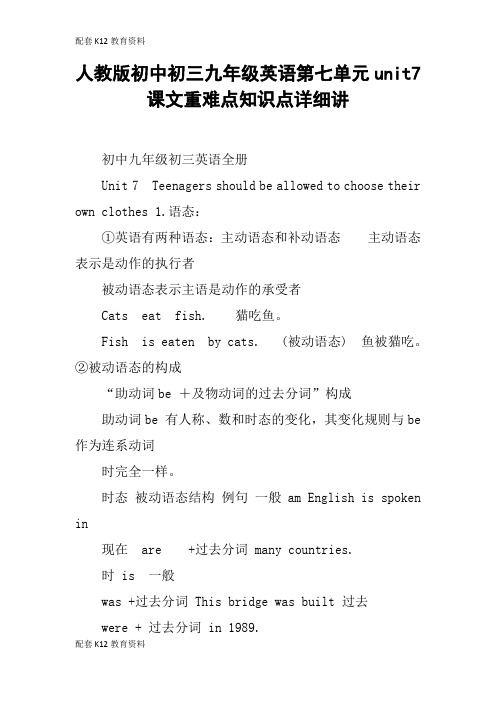
人教版初中初三九年级英语第七单元unit7课文重难点知识点详细讲初中九年级初三英语全册Unit 7 Teenagers should be allowed to choose their own clothes 1.语态:①英语有两种语态:主动语态和补动语态主动语态表示是动作的执行者被动语态表示主语是动作的承受者Cats eat fish. 猫吃鱼。
Fish is eaten by cats. (被动语态) 鱼被猫吃。
②被动语态的构成“助动词be +及物动词的过去分词”构成助动词be 有人称、数和时态的变化,其变化规则与be 作为连系动词时完全一样。
时态被动语态结构例句一般am English is spoken in现在 are +过去分词 many countries.时 is 一般was +过去分词 This bridge was built 过去were + 过去分词 in 1989.时can/should 情态 may +be+The work must be 动词过去分词 done right now. must/…③被动语态的用法当我们不知道谁是动作的执行者,或者没有必要指出谁是动作的执行者,或者只需强调动作的承受者时,要用被动语态。
2. allow sb. to do sth. 允许某人做某事如:Mother allows me to watch TV every night. 妈妈允许我每晚看电视。
be allowed to do sth. 被允许做某事如: Lily is allowed to go to Qinzhou. 莉莉被允许去钦州。
3. get their ears pierced 穿耳洞让/使做某事 get sth. done (过去分词) have sth. done (过去分词)如:I get my car mended. = I have my car mended. 我让别人修好我的车初中九年级初三英语全册初中九年级初三英语全册4. enough 足够形容词+enough 如:beautiful enough 足够漂亮enough+名词如:enough food 足够食物enough to 足够…去做…如:I have enough money to go to Beijing. 我有足够的钱去北京。
人教版九年级英语第七单元知识点梳理

人教版九年级英语第七单元知识点梳理Unit 7 Teenagers should be allowed to choose their own clothes.一、短语:1.part-time jobs兼职工作2.a driver’s license驾照3.at that age在那个年纪4.on school nights在上学期间的晚上5.clean up清扫6.get in the way of挡道、妨碍7.at most最多8.the other day前几天9.all my classmates我所有的同学10.concentrate on全神贯注于11.be good for对…有益12.in groups成群的,按组13.get noisy吵闹14.learn from向...学习15.at present目前,现在16.have an opportunity to do有做……的机会二、知识点:1.allow sb.to do sth.:允许某人做某事,如:Mother allows me to watch TV every night.妈妈允许我每晚看电视。
be allowed to do sth.:被允许做某事(被动语态),如:LiLy is allowed to go to Qinzhou.莉莉被允许去钦州。
2.get sth.done:让/使(别人)做某事,如get myears pierced穿(我的)耳洞。
3.enough:足够,形容词+enough(这一点比较容易出题),如:beautiful enough 足够漂亮。
enough+名词,如:enough food足够食物4.stop doing sth.:停止正在做的事,如Please stop speaking.请停止说话。
stop to do sth.:停止一件事去做另一件事,如Please stop to speak.请停下来说话。
(完整word版)人教版九年级英语第七单元知识点归纳

Unit 7 Teenagers should be allowed to choose their own clothes一、必记单词①名词:license 证,证件safety安全,安全性field田野,场地poem诗,韵文community社区,社团chance机会,可能性society社会choice选择,挑选②动词:educate教育,训导manage完成(困难的事);应付(困难局面)enter进来,进去③动词&名词:smoke吸烟,冒烟;烟cry哭,叫喊hug拥抱,搂抱lift举起,太高;电梯regret感到遗憾;懊悔,后悔support支持④ 形容词:tiny极小的,微小的awful很坏的,讨厌的⑤副词:badly严重地;差;非常;二、短语Have part—time jobs 做兼职工作get earshot pierced 扎耳洞Talk back回嘴,顶嘴keep。
.。
away from避免接近,远离Make one’s own decision自己做决定get in the way of挡..。
的路;妨碍Have nothing against 不反对be serious about认真对待三、小语法讲解:1.No way!不行!No way意为“不行”,这是英语口语中一个直接拒绝对方的表达用语,强调不能按照他人的要求去做某事或不允许别人做某事。
Can I borrow your bike?No way!2.I don’t think sixteen-year—olds should be allowed①宾语从句跟在think,believe,suppose,expect等动词后,当主句是一般现在时,且主句的主语是第一人称(I,We)时,变否定句时,要否定主句,而不是从句,我们称之为“否定前移”;变反意疑问句时,附加问句要与从句一致。
I think you are rightI don’t think you are rightI don’t think he is clever,is he?注意:如果主句的主语是第二,第三人称,变否定句时,要在从句否定;变反意疑问句时,附加句要与主句一致。
人教版英语九年级Unit 7知识点总结

九年级Unit 7 Teenagers should be allowed to choose their own clothes. 讲义一、词性转换Section A1. safety→ (adj.) safe2. part-time → (反义词.) full-time3. badly → (adj.) bad4. educate → (n.) education5. manage → (n.) management Section B6. enter → (n.) entrance7. choice → (v.) choose二、短语归纳1. be worried about 为…担心2. have part-time jobs做兼职工作3. get one’s ears pierced打耳洞4. be excited about对…感到兴奋5. take lots of photos拍许多照片6. by my side在我身边7. through the field穿过田间8. make sure确信9. keep…from…使…避开…10. give sb. a hug给某人一个拥抱11. talk back顶嘴12. listen to sb.听某人说13. agree with sb.赞同某人14. learn…from…向…学习…15. keep…away from…使…避免接近…;使…远离…16. make one’s own decisions 自己做决定17. manage one’s own life应付自己的生活18. be strict with sb. 对某人要求严格19. get in the way of挡…的路;妨碍20. achieve one’s dreams实现某人的梦想21. how much多么22. end up结束23. be serious about认真对待…24. care about关心25. make this choice做出这个选择26. in the end最后27. keep off关闭1. be allowed to do sth. 被允许做某事2. stop doing sth. 停止做某事3. get sth. done使某事被做4. should do sth. 应该做某事5. what to do做什么6. need to do sth. 需要做某事7. spend time with sb. 与某人共度时光8. be excited about doing sth.对做某事感到兴奋9. hurt oneself伤到自己10. give sth. to sb.把某物给某人11. regret doing sth. 懊悔做某事12. allow sb. to do sth. 允许某人做某事13. practice ding sth. 练习做某事14. take care of oneself照顾自己15. start doing sth. 开始做某事16. continue to do sth. 继续做某事17. see sb. do sth. 看见某人做过某事18. love doing sth. 喜欢做某事19. have nothing against doing sth.不反对做某事20. have a chance to do sth. 有机会做某事21. spend more time on sth. 在某事上花费更多时间三.重点句子1. I don’t think sixteen-year-olds should be allowed to drive. 我认为不应该允许16虽的青少年开车。
人教九年级英语unit7知识点
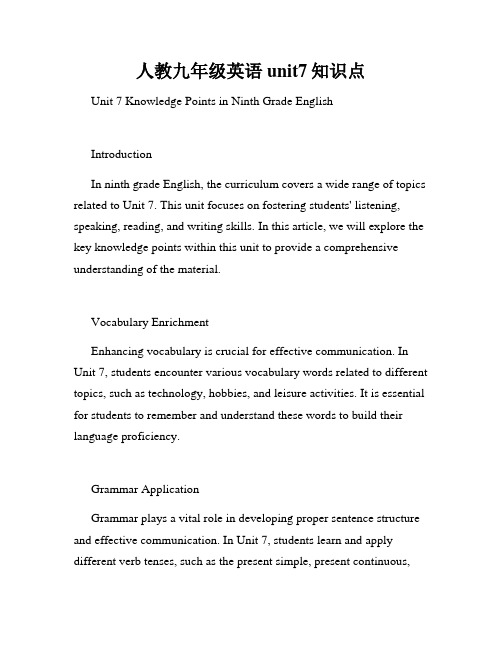
人教九年级英语unit7知识点Unit 7 Knowledge Points in Ninth Grade EnglishIntroductionIn ninth grade English, the curriculum covers a wide range of topics related to Unit 7. This unit focuses on fostering students' listening, speaking, reading, and writing skills. In this article, we will explore the key knowledge points within this unit to provide a comprehensive understanding of the material.Vocabulary EnrichmentEnhancing vocabulary is crucial for effective communication. In Unit 7, students encounter various vocabulary words related to different topics, such as technology, hobbies, and leisure activities. It is essential for students to remember and understand these words to build their language proficiency.Grammar ApplicationGrammar plays a vital role in developing proper sentence structure and effective communication. In Unit 7, students learn and apply different verb tenses, such as the present simple, present continuous,and past simple. Understanding the appropriate usage of these tenses enables students to express ideas accurately and fluently.Reading ComprehensionUnit 7 comprises several reading passages that aim to develop students' reading comprehension skills. These passages cover a wide range of topics, including the effects of technology, travel experiences, and cultural differences. By analyzing and comprehending these texts, students enhance their reading skills while gaining knowledge about the world around them.Listening ComprehensionListening comprehension is an essential aspect of language learning. In Unit 7, students are exposed to various audio materials, such as dialogues, conversations, and monologues. These listening exercises allow students to practice their listening skills, improve their understanding of spoken English, and develop the ability to extract key information.Speaking PracticeUnit 7 also emphasizes the development of speaking skills. Students engage in a variety of activities, such as role-plays, group discussions,and presentations. These exercises enable students to express their thoughts, opinions, and ideas confidently. Additionally, they enhance their ability to communicate effectively in both formal and informal settings.Writing SkillsDeveloping writing skills is an integral part of the curriculum in Unit 7. Students learn different types of writing, such as formal letters, emails, and informal messages. Through guided writing tasks, students practice organizing their ideas coherently, using appropriate language and grammar, and conveying their message effectively in writing.Cultural AwarenessUnit 7 offers opportunities for students to explore cultural awareness. By reading and discussing texts about different cultures, traditions, and customs, students broaden their knowledge and understanding of the diversity in the world. This knowledge fosters empathy and open-mindedness, promoting cultural sensitivity and appreciation.ConclusionIn conclusion, Unit 7 in ninth grade English provides students with valuable knowledge and skills to enhance their language proficiency. From vocabulary enrichment to grammar application, reading comprehension to listening practice, and speaking and writing skills, students are presented with a variety of opportunities to improve their English abilities. Furthermore, the unit fosters cultural awareness and understanding, nurturing well-rounded individuals who can communicate effectively and appreciate the diversity of the world.。
人教版九年级英语Unit7知识点归纳
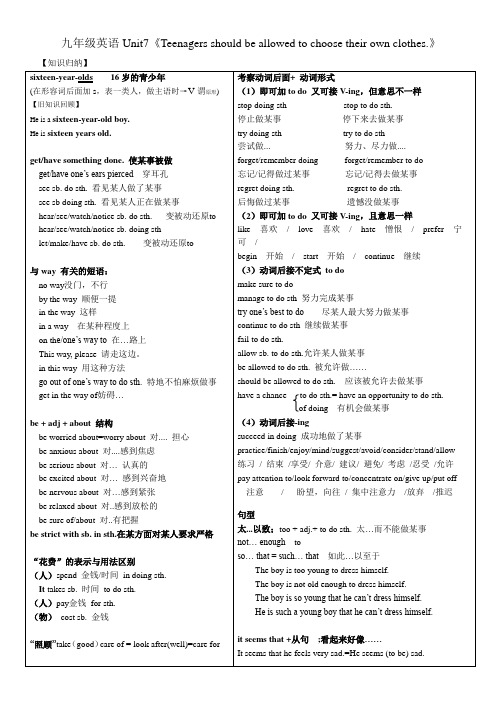
manage to do sth努力完成某事
try one’s best to do尽某人最大努力做某事
continue to do sth继续做某事
fail to do sth.
allow sb. to do sth.允许某人做某事
be allowed to do sth.被允许做……
so… that = such… that如此…以至于
The boy is too young to dress himself.
The boy is not old enough to dress himself.
The boy is so young that he can’t dress himself.
【反义词】disagree with sb.不同意某人的观点
【派生词】n. agreement--- disagreement
be in agreement意见一致
与keep有关的用法
keep sb. (away) from sth使某人远离某物
keep out不让进入
keep sb./sth.+adj.使…保持
at the end of-----at the beginning of
in the end=at last=finally最后
by the end of …
“足够”
形容词+enough(这一点还是比较容易出题的)
如:beautiful enough足够漂亮
enough+名词
如:enough food足够食物
考察动词后面+动词形式
(1)即可加to do又可接V-ing,但意思不一样
人教版九年级英语第七单元重点短语及句型知识点小结

人教版九年级英语第七单元重点短语及句型知识点小结Unit 7 Teenagers should be allowed to choose their own clothes.一.重点短语1. choose their own clothes选择自己的衣服2. be serious about对…认真,严肃3. care about担心4. eight hours’ sleep八小时的睡眠5. driver’s/driving license驾照6. instead of doing sth代替做某事7. wear uniforms穿校服8. be good for对…有益be bad for对…有害9. a fifteen-year-old boy一个15岁的男孩10. talk back回嘴,顶嘴11. volunteer to do sth志愿做某事12. make my own decision 做自己的决定13. old people’s home养老院14. the importance of …的重要性15. make sure确保16. a professional runner一个专业的赛跑者17.keep…away from远离get in the way of挡…路;妨碍18. stay up 熬夜19. a part-time job兼职20. be strict with sb. 对某人严厉be strict in sth对某事严厉二.重点句型1.She is a sixteen-year-old girl.=She is sixteen years old.2. allow sb. to do sth. 允许某人做某事(主动语态)be allowed to do sth. 被允许做某事(被动语态)Mother allows me to watch TV every night.LiLy is allowed to go to America.3. get their ears pierced 穿耳洞让/使(别人)做某事get sth. done(过去分词)have sth. doneI get my hair cut. == I have my hair cut.4. enough 足够形容词+enough 如:beautiful enough足够漂亮enough+名词如:enough food 足够食物enough…to 足够…去做…例:I have enough money to go to Beijing. 我有足够的钱去北京。
人教版英语九年级Unit7单元知识点归纳
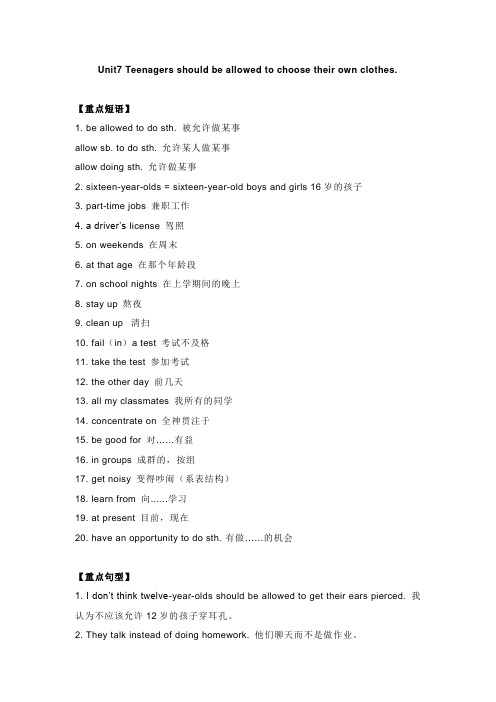
Unit7 Teenagers should be allowed to choose their own clothes.【重点短语】1. be allowed to do sth. 被允许做某事allow sb. to do sth. 允许某人做某事allow doing sth. 允许做某事2. sixteen-year-olds = sixteen-year-old boys and girls 16岁的孩子3. part-time jobs 兼职工作4. a driver’s license 驾照5. on weekends 在周末6. at that age 在那个年龄段7. on school nights 在上学期间的晚上8. stay up 熬夜9. clean up 清扫10. fail(in)a test 考试不及格11. take the test 参加考试12. the other day 前几天13. all my classmates 我所有的同学14. concentrate on 全神贯注于15. be good for 对…...有益16. in groups 成群的,按组17. get noisy 变得吵闹(系表结构)18. learn from 向......学习19. at present 目前,现在20. have an opportunity to do sth. 有做……的机会【重点句型】1. I don’t think twelve-year-olds should be allowed to get their ears pierced. 我认为不应该允许12岁的孩子穿耳孔。
2. They talk instead of doing homework. 他们聊天而不是做作业。
3. He is allowed to stay up until 11:00 pm. 允许他们熬到晚上11点。
人教版九年级英语u7知识点总结
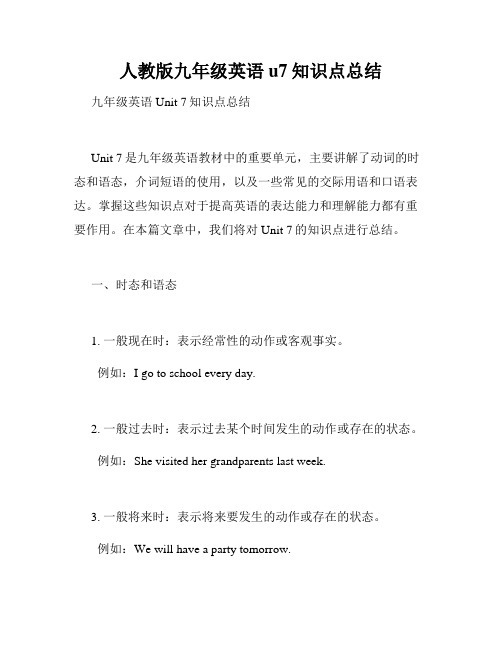
人教版九年级英语u7知识点总结九年级英语Unit 7知识点总结Unit 7是九年级英语教材中的重要单元,主要讲解了动词的时态和语态,介词短语的使用,以及一些常见的交际用语和口语表达。
掌握这些知识点对于提高英语的表达能力和理解能力都有重要作用。
在本篇文章中,我们将对Unit 7的知识点进行总结。
一、时态和语态1. 一般现在时:表示经常性的动作或客观事实。
例如:I go to school every day.2. 一般过去时:表示过去某个时间发生的动作或存在的状态。
例如:She visited her grandparents last week.3. 一般将来时:表示将来要发生的动作或存在的状态。
例如:We will have a party tomorrow.4. 现在进行时:表示现在正在进行的动作。
例如:They are playing soccer in the park.5. 过去进行时:表示过去某个时间正在进行的动作。
例如:He was studying when I called him.6. 现在完成时:表示过去某个时间开始,一直持续到现在的动作或状态。
例如:She has lived in this city for 10 years.7. 过去完成时:表示在过去某个时间点之前已经完成的动作或状态。
例如:They had finished their homework before dinner.8. 被动语态:由助动词be动词的过去分词形式构成,表示动作的接受者。
例如:The book was written by him.二、介词短语的使用1. at: 表示具体的时间点,例如:at 9 o'clock.2. in: 表示在某个时间段内,例如:in June.3. on: 表示在某一天或日期上,例如:on Monday.4. for: 表示持续的时间,例如:for two hours.5. from...to: 表示从某一时间到另一时间,例如:from Monday to Friday.6. with: 表示伴随或陪同,例如:go shopping with friends.三、交际用语和口语表达1. How do you say...in English? 用英语怎么说……?2. Can you speak English? 你能说英语吗?3. Sorry, I can't understand. 对不起,我听不懂。
人教版九年级英语第七单元知识点归纳

人教版九年级英语第七单元知识点归纳为了满足你的要求,我将按照九年级英语第七单元知识点的格式来进行归纳。
正文如下:Unit 7 Knowledge Points1. Vocabulary1.1. Words related to environment:- pollution- global warming- carbon footprint- deforestation- renewable energy- sustainable development1.2. Words related to health and fitness:- diet- nutrition- exercise- obesity- physical activity- well-being2. Grammar2.1. Past simple tense:- Used to talk about completed actions in the past.- Formed by adding "-ed" to regular verbs or using irregular verb forms.- Examples: I visited my grandparents last weekend. She cooked a delicious meal yesterday.2.2. Comparison of adjectives and adverbs:- Comparative form: used to compare two things/people.- Superlative form: used to compare more than two things/people.- Examples: This book is more interesting than the previous one. She is the tallest girl in our class.3. Reading3.1. Reading strategies:- Skimming: quickly looking over the text to get a general sense of the content.- Scanning: searching for specific information in the text.- Guessing meaning from context: using surrounding words and sentences to understand the meaning of unknown words.3.2. Reading comprehension skills:- Identifying main ideas.- Making inferences.- Understanding details.4. Listening4.1. Listening for specific information:- Listening to identify key details in a conversation or passage.- Examples: Listen to the audio and answer the questions about the speaker's hobbies.4.2. Listening for gist:- Listening to get a general understanding of the topic or purpose of the conversation or passage.- Examples: Listen to the news report and determine the main idea.5. Writing5.1. Writing a descriptive paragraph:- Describing a person, place, or object using sensory details and vivid language.- Organizing ideas logically and using appropriate paragraph structure.- Example: Write a paragraph describing your favorite vacation destination.5.2. Writing an opinion essay:- Presenting and supporting personal opinions on a particular topic.- Using transitional words and phrases to connect ideas.- Example: Write an essay expressing your views on the importance of recycling.6. Speaking6.1. Expressing preferences:- Using phrases like "I prefer…", "I would rather…", "I like…", "Idis like…" to talk about personal preferences.- Example: Share your preferences for different types of movies and explain why.6.2. Giving reasons and justifying opinions:- Supporting opinions with reasons and examples.- Example: Give reasons why you believe it is important to protect the environment.This summarizes the key knowledge points covered in the 7th unit of the 9th-grade English textbook.。
人教版九年级英语第七单元知识点归纳

人教版九年级英语第七单元知识点归纳Teenagers Should Be Allowed to Choose Their Own ClothesIn our society。
teenagers are often not allowed to make their own ns。
including what they wear。
However。
I strongly believe that teenagers should be allowed to choose their own clothes。
Firstly。
allowing teenagers to choose their own clothes can help them express themselves and their individuality。
Teenagers are in a stage of life where they are discovering who they are and what they want to be。
Allowing them to choose their own clothes can give them a chance to show their personality and creativity。
Secondly。
it is important for teenagers to learn how to make their own ns。
By allowing them to choose their own clothes。
they can learn about n-making and the consequences of their choices。
This can be a valuable lesson that they can apply to other areas of their lives。
人教版九年级全一册英语Unit7单元语法知识点总结

人教版九年级全一册英语Unit7单元语法知识点总结本单元重点短语的具体用法1. get his driver’s license:取得驾驶执照。
例如:He finally got his driver's license after many attempts.(经过多次尝试,他终于拿到了驾驶执照。
)2. no way:没门,不行。
例如:- Can I have a day off?(我能请一天假吗?)- No way!(不行!)3. sixteen-year-olds:十六岁的人,是一个复数名词,表示十六岁的群体。
例如:Sixteen-year-olds are not allowed to vote in this country.(在这个国家,十六岁的人不被允许投票。
)而sixteen-year-old 则是一个形容词,用来修饰名词,表示“十六岁的”。
例如:He is a sixteen-year-old boy.(他是一个十六岁的男孩。
)4. be worried about = worry about:担心,担忧。
例如:Don't worry about the exam. You will do fine.(不要担心考试,你会做得很好的。
)或者She is worried about her son's health.(她担心她儿子的健康。
)5. have part-time jobs:做兼职工作。
例如:Many college students have part-time jobs to earn some extra money.(许多大学生做兼职工作来赚一些额外的钱。
)6. get one’s ears pierced:打耳洞。
例如:She wants to get her ears pierced, but her parents don't allow it.(她想打耳洞,但她的父母不允许。
九年级英语人教版第七单元知识点汇总

九年级英语人教版第七单元知识点汇总一、句型(含有情态动词的被动语态)1.Teenagers should be allowed to have part-time jobs.2.Old people should be spoken to politely.3.I agree.I don’t agree = I disagree.二、短语1.allow sb to doallow doingbe allowed to do2.no way 不行(反)OK \ all right3.part-time job 兼职工作\ full-time job 全职工作4.one’s own 某人自己的on one’s own = by oneself =alone 独自5.be excited about 对 ... 感到兴奋6.make sure 确保7.keep sb (away) from 使某人远离…… \不做……8.hurt oneself = get hurt 受伤9.give sb a hug 给某人一个拥抱give sb a lift \ ride 让某人搭便车10.talk back 顶嘴11.m ake one’s own decision 自己做决定12.take \ have a test 进行测验pass the test 通过测验fail the test 测验不及格13.be strict in sth 对某事要求严格be strict with sb 对某人要求严格14.get in the way of 妨碍15.achieve \ realize one’s dream 实现某人的梦想16.have nothing against 不反对17.end up doing 结果做了end up as … 结果成为…18.be serious about 对 ... 是认真的19.take photos 照相look after = take care of 照顾三、结构get sb to do 让\ 请某人做某事= have sb doget sth done 让\ 请某人做某事= have sth done。
人教版九年级英语第七单元知识讲解

⼈教版九年级英语第七单元知识讲解Unit 7 Teenagers should be allowed to choose their own clothes.词句精讲精练【词汇精讲】1. choosechoose作动词,意为“选择,挑选”,后接宾语,常⽤搭配如下:choose sth. for sb. 为某⼈选择某物;choose sb. to do sth. 选择某⼈做某事;choose + wh从句(where,what,when等引导的特殊疑问句)例如:We have chosen a birthday present for you. 我们已经为你选择了⼀个礼物。
I’d like to choose Jim to go there with me. 我选择吉姆和我⼀起去。
Our teacher will let us choose where we should have our picnic.我们⽼师要我们选择哪⼉野炊。
2. chance(1)chance表⽰“机会”,是可数名词,要表⽰“做某事的机会”,其后可接to do sth. 或of doing sth.。
例如:It is a good chance to study English. 这是学习英语的好机会。
I have a chance of going to Beijing. 我有机会去北京。
(2)表⽰“希望”、“可能性”,可⽤作可数名词或不可数名词。
要表⽰“做某事的可能性”,通常后接“of doing” 形式。
例如:He has a good chance of winning. 他很有希望获胜。
There is still chance that you will pass the exam.你考试及格还是有希望的。
(3)⽤于by chance, 意为“偶然地”、“⽆意中”。
例如:He met her by chance. 他是偶然遇到她的3. manage(1) 作动词,意为“管理;经营;处理”。
人教版英语九年级第七单元知识点总结
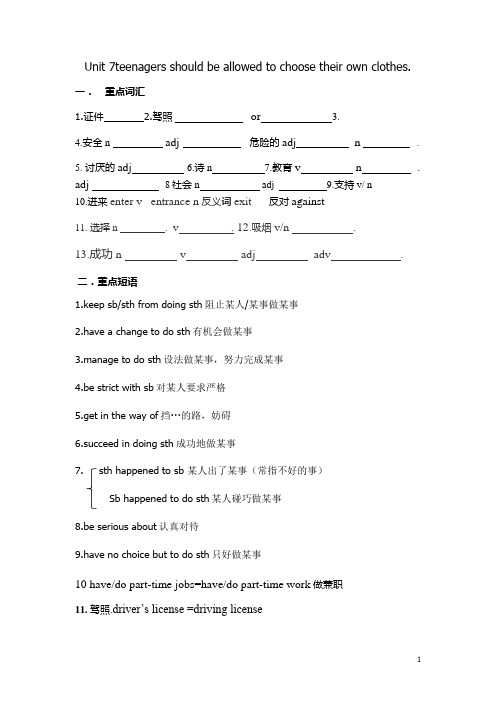
Unit 7teenagers should be allowed to choose their own clothes.一.重点词汇1.证件2.驾照 or3.4.安全n adj 危险的adj n .5. 讨厌的adj6.诗 n7.教育v n . adj 8社会n adj 9.支持v/ n10.进来enter v entrance n反义词exit反对against11. 选择n . v . 12.吸烟v/n .13.成功n v adj adv .二.重点短语1.keep sb/sth from doing sth阻止某人/某事做某事2.have a change to do sth有机会做某事3.manage to do sth设法做某事,努力完成某事4.be strict with sb对某人要求严格5.get in the way of挡···的路,妨碍6.succeed in doing sth成功地做某事7. sth happened to sb 某人出了某事(常指不好的事)Sb happened to do sth某人碰巧做某事8.be serious about认真对待9.have no choice but to do sth只好做某事10 have/do part-time jobs=have/do part-time work做兼职11.驾照.driver’s license =driving license12.拥抱某人give sb. a hug = hug sb.13.后悔做了… regret doing sth eg. I regret telling a lie.遗憾做…(没做) regret to sth eg.I regret to tell you that you failed the exam.14回嘴talk back 15.做出自己的决定make one’s own decision三、重点语法考点1.get/have/make sth done表被动 eg: have/get/make my ears piercedhave/get/make my hair cut2.should allow sb to do sthsb should be allowed to do stheg.We should allow teenagers to choose their own clothes.Teenagers should be allowed to choose their own clothes.Teenagers shouldn’t be allowed to choose their own clothes.Should teenagers be allowed to choose their own clothes?Why should teenagers be allowed to choose their own clothes?情态动词的被动语态是:情态动词(not)+be + done3.I don’t think sixteen-year-olds should be allowed to drive.若宾语从句跟在think 、believe 、suppose (猜想推测)guess(猜)image(想象) expect(期待)等动词之后,而主语为第一人称时,句子的否定体现在主句上。
人教版九年级英语上册第七单元考点要点总汇

人教版九年级英语上册第七单元考点要点总汇Unit 7 Teenagers should be allowed to choose their ownclothes.Section A1a一.allow的用法:1.allow sb. to do sth. My teacher doesn`t allow us to speak Chinese in his English lesson.被动结构为:We are not allowed to speak Chinese in his English class.2.allow doing sth.(allow后面不能直接跟to:即不能用成allow to do sth.)We don`t allow eating in the classroom.二.sixteen-year-olds 16岁的未成年人们= sixteen-year-old children三.get ones ears pierced打耳洞→get sth. done让某事被做(1)get sth. done 相当于have sth. done 让某事被做:I want to get my hair cut.我想剪发(头发被剪)I want to have my hair cut(2) get sb to do 相当于have sb do让某人做某事The teacher gets students to do homework every day. The teacher has students do homework every day.(3) get sb doing 相当于have sb doing让某人一直做某事He gets the horse running all day.He has the horse running all day.四.need的用法1)作情态动词1.need作情态动词,有着与其他情态动词一样的共性:无人称或数的变化,后接动词原形。
九年级英语第七单元知识点
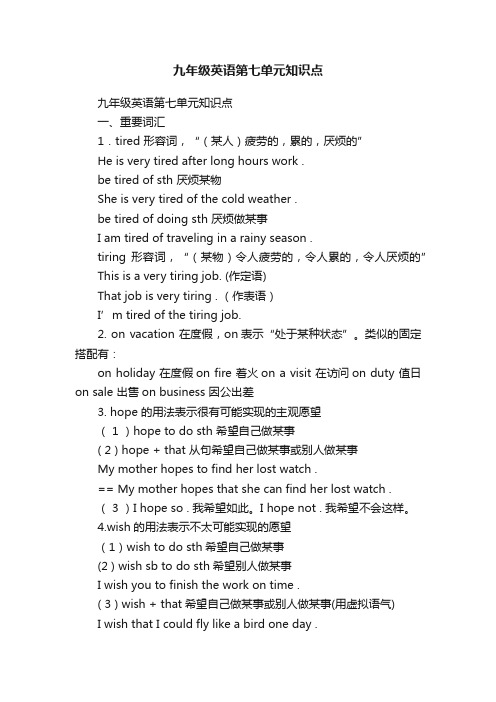
九年级英语第七单元知识点九年级英语第七单元知识点一、重要词汇1.tired 形容词,“(某人)疲劳的,累的,厌烦的”He is very tired after long hours work .be tired of sth 厌烦某物She is very tired of the cold weather .be tired of doing sth 厌烦做某事I am tired of traveling in a rainy season .tiring 形容词,“(某物)令人疲劳的,令人累的,令人厌烦的”This is a very tiring job. (作定语)That job is very tiring . (作表语)I’m tired of the tiring job.2. on vacation 在度假,on表示“处于某种状态”。
类似的固定搭配有:on holiday 在度假on fire 着火on a visit 在访问on duty 值日on sale 出售on business 因公出差3. hope 的用法表示很有可能实现的主观愿望( 1 )hope to do sth 希望自己做某事( 2 ) hope + that 从句希望自己做某事或别人做某事My mother hopes to find her lost watch .== My mother hopes that she can find her lost watch .( 3 )I hope so . 我希望如此。
I hope not . 我希望不会这样。
4.wish的用法表示不太可能实现的愿望(1)wish to do sth希望自己做某事(2 ) wish sb to do sth希望别人做某事I wish you to finish the work on time .( 3 ) wish + that希望自己做某事或别人做某事(用虚拟语气)I wish that I could fly like a bird one day .(4) wish sb. + 名词祝愿某人怎么样I wish you happiness .I wish you a success \ a good health .5. consider 仔细考虑,顾及,考虑到(1)consider doing sth 考虑做某事He is considering going to study abroad .They are considering changing the plan .(2) consider + 疑问词+ 不定式考虑、、、、、、We are considering how to get there .Have you considered what to do next ?(3) consider + 宾语+ ( to be ) 认为是、、、、、、I consider him ( to be ) my best friend .He considers himself ( to be ) very clever (聪明的)。
- 1、下载文档前请自行甄别文档内容的完整性,平台不提供额外的编辑、内容补充、找答案等附加服务。
- 2、"仅部分预览"的文档,不可在线预览部分如存在完整性等问题,可反馈申请退款(可完整预览的文档不适用该条件!)。
- 3、如文档侵犯您的权益,请联系客服反馈,我们会尽快为您处理(人工客服工作时间:9:00-18:30)。
人教版九年级英语第七单元知识点总结Unit7 Teenagers should be allowed to choose their ownclothes.一.单词License safety smoke part-time pierce earring flash tiny cry field hug lift badly talk back awful teen regret poem community keep…away from chance make one’s own decision educate manage society get in the way of support enter choiceWe should allow teenagers to choose their own clothes.Teenagers should be allowed to choose their own clothes.Teenagers shouldn’t be allowed to choose their own clothes.Should teenagers be allowed to choose their own clothes?Why should teenagers be allowed to choose their own clothes?二.1.driver’s license 驾照=driving licensehave/do part-time jobs=have/do part-time work做兼职2.get/have/make sth done 表被动 eg: have/get/make my ears pierced have/get/make my hair cut3.give sb. a hug = hug sb. 拥抱某人4.succeed v. 成功(过去式succeeded)success n. 成功(一般为不可数,说到具体的某一次成功时为可数) successful adj. 成功的5.against 介词,反对,反义词是for另;对抗6.manage v.管理,努力完成manager n.经理manage to do 设法做成某事区分 try to do sth7.important adj.重要的,important=of importance n.重要性8.regret后悔做了… regret doing sth I regret telling a lie.遗憾做…(没做) regret to sth I regret to tell you that you failed the exam.9.enter v-entrance n-反义词exit10.should allow sb to do sth被动 sb should be allowed to do sth情态动词的被动语态是:情态动词(not)+be + done11.go to the shopping centre their own clothes12.I don’t think sixteen-year-olds should be allowed to drive.(1)若宾语从句跟在think believe等表示“想,认为”的动词之后,而主语为第一人称时,句子的否定体现在主句上。
用词有: suppose (猜想推测)guess(猜) image(想象) expect(期待)eg: I don’t think it isa good idea.(2) sixteen-year-olds十六岁的孩子们13.need time to do sth14.be excited about doing sth15由so+助动词(be/do/will/have)/情态动词+主语:….也是一样Neither/nor+助动词(be/do/will/have)/情态动词+主语(前为否定)….也一样不。
(1)She is a student. So am I.(2)She went to school just now. So did I.(3)She has finished the work. So have I(4)Tom can’t swim. Neither can John.补充;So+主+助动词确实如此16.mustn’t do sth 禁止做某事 stay by one’s hand待在某人身边think back to sth回想某事have scary/awful dreams 做噩梦be late for school tell back to sb跟某人顶嘴 run through the field跑步穿越田野(through内部穿过如森林across外部穿过如马路) make sure=be sure确信cough badly剧烈咳嗽 warm arms to sleep in 温暖怀抱里入眠17. lift sb up举起某人lift及物动词,意为“举起,抬高,搬动”强调用力把某物从地面提到一定高度。
raise及物动词,意为“抬高,提高”强调动作的姿态+one’s hand/a flag/one’s voiceEg:The package might be too heavy to lift.If you have any questions, please raise your hand.18.stop doing sth 停止做某事Stop to do sth 停下来开始做某事19.by+时间点几点前 stay out待在外面 the whole +n =all the +n all night 整夜 agree with sb/sthI agree. I don’t agree.=I disagree. move out 搬出去住 take care of=look after照顾take care=be careful小心care about关心,在乎 care for 喜欢;照顾,为…操心 continue to do sth 继续做某事worry about doing sth=be worried about doing sth20.take/pass/fail the exam take the exam later补考21.be strict with sb be strict in sth/doing sth22.get/be in the way of sth 妨碍… in this way/in the way/on the way/on one’s way to/by the wayPractice doing sth be serious about sth/doing sth instead of doing sth23.every one /everyoneeveryone是一个词,只用来指人,等于 everybody,在它后面不能跟介词of; every one是两个词,既可用来指人,也可用来指物,等于each one,后面可跟介词of.请看以下例句:1)Everyone of the children likes this game.(误)2)Every one of the children likes this game.(正)3 ) His books are wonderful. I have read every one of them.24.end up as/as much as/on his school team/professional runner/grow up25.we have nothing against running.Have nothing against doing sth毫不反对做某事be against 反对 be for 支持26.Only then will I have a chance to achieve my reams.当副词only置于句首,强调方式、条件、地点、时间状语等状语时,句子要用倒装语序。
Only in this way can we learn English well.当only后跟的是主语时,不用倒装。
Only five men were hurt in the accident.27.keep off关闭,阻挡Mobile phone should be kept off during the meeting.28.Care for(1)like;=be fond of 喜爱1)She doesn't care for that color.她不喜欢那种颜色。
2)She did not care for him.她不喜欢他。
(2)take care of;look after 照顾1)As an orphan,he is cared for by the local authorities.他是个孤儿,受到当地政府的照顾。
2)He spent years caring for his sick mother.他数年中一直在照顾生病的母亲。
Care aboutv. 担心接近be worried, be concerned or interested 指:忧虑、担心、关心、Do not you care about anybody? 你难道谁也不关心吗?I really care about my work. 我真的关心我的工作。
29.用must\need\may开头的疑问句回答的肯定和否定回答形式—Must I do it at once?—No,you ____ .A.mustn't B.needn't C.can't D.don't此题应选B。
一般说来,以must 引出的一般疑问句,其否定回答通常是用 needn't(=don't have to),这与其说是一个语法问题,不如说是一个语境或上下文是否通顺的问题。
注意以下各组问答句,并注意体会其汉语译文:1.—Must I come before dawn?我必须天亮前来吗?—Yes, you must.是的,必须天亮前来。
—No, you needn't.不必天亮前就来。
—No, you don't have to.不必天亮前就来。
2.—May I smoke in the room?我可以在这个房间抽烟吗?—Yes, you may.当然可以。
